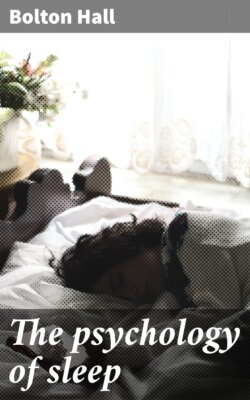Читать книгу The psychology of sleep - Bolton Hall - Страница 17
На сайте Литреса книга снята с продажи.
CHAPTER XIII
THE SLEEP OF THE INVALID
ОглавлениеTable of Contents
Sleep, O gentle Sleep,
Nature’s soft nurse—
Shakespeare.
We should not think that, because we are ill, it is natural that we should not sleep. The invalid needs more and better sleep than the robust person—and the invalid can have it.
It is true that, as more and better sleep comes, the invalid will cease to be an invalid—at least that is the beginning of the end of invalidism. For Nature provides sleep as the “balm of hurt minds”—a cure for body or mind that needs restoring.
In the case of severe illness the physician in charge feels relieved when he learns that his patient is sleeping well. The professional idea of sleep is that nutrition goes on most perfectly during sleeping hours; that is, that Nature repairs all the waste that results from the use of brain and muscle during our waking hours. The more prolonged and undisturbed the sleep is, the more opportunity Nature has to make good the extra demands made upon the system by disease. It opens the way for the “Vis Medicatrix Naturæ”—the healing power of Life.
Take, for example, the fever patient. Anyone who has watched beside a loved one slowly consuming, with the fever raging in his blood, will remember the sigh of relief that has gone up from physician and nurse when the patient falls into a natural sleep after the turn of things. During dreadful nights and anxious days we wait breathlessly for the “crisis”; we hang upon the physician’s word, scan his face for every fleeting expression, because we may be deceived by the disease, but his practiced eye should know. But we do not need his assurance when the moaning and restlessness pass, when the stertorous breathing quiets, when the skin becomes moist, and the gentle, regular breathing tells us that natural sleep has come. If we can be spared, we go out under the stars and, whether Christian or pagan, up from the depths of our souls wells a prayer of thankfulness to “whatever gods there be” for the incomparable blessing of sleep. We feel as if we could “go softly all our days” before the powers who have decreed that sleep shall gently steep the eyelids of the one we love.
Nourishment, in the form of food, is desirable, but more important still is the sleep when Nature busies herself building new tissue and blood to make good the ravages of fever’s siege. We are careful to keep even good news from the patient, if we have cause to fear that it will prove too stimulating, and everything depressing or alarming is absolutely withheld, because sleep is the paramount need of the depleted body.
We all recognize the value of sleep to the person just past the crisis of a severe illness, and the next thing to learn is that to the person invalided through some less active cause, it is as necessary, and that it may be had.
It may seem an extravagant statement to say that the invalid should be able to summon sleep at will even better than an active, healthy person. But we may see the truth of this statement if we accept Dr. Edward Binns’ assurance that “in no sense can fatigue be said to be the cause of sleep,” so that the usual claim that the sick do not get an opportunity to weary themselves, and so cannot expect sound sleep, cannot be accounted a reason for sleeplessness of the invalid.
To be sure, lying abed is not always restful. A friend of mine was kept in bed for some weeks by a broken ankle. It was necessary to remain in the one position day and night, which so wore upon her nervous organization that she grew restless and “lost” much sleep. In this condition, she said the hardest thing to bear was the well-meant congratulations of her friends that at least she was “getting a much-needed rest.” But the real reason why an invalid should learn to sleep at will is because sleep alone can do what Macbeth asks of the physician:
“Canst thou not minister to a mind diseased,
Pluck from the memory a rooted sorrow,
Raze out the written troubles of the brain,
And with some sweet oblivious antidote
Cleanse the stuff’d bosom of that perilous stuff
Which weighs upon the heart?”
Yes, sleep can do this; and illness has need of just such comfort. The enforced idleness leads to much reflection and the nervous system is then ill-adapted to endure emotional strain. If pain be added there is still greater need for sleep. Nor is pain absolutely hostile to sleep: the writer can often go to sleep while the dentist is drilling and filling his teeth, and Dr. J. Howard Reed says that this is not very uncommon.
Pain is Nature’s strong protest against overstimulation or overexertion and the exhaustion which it occasions is itself conducive to sleep. It would be better for us to heed that protest and use our intelligence to secure sound, refreshing sleep, that Nature might perfect her cures.
